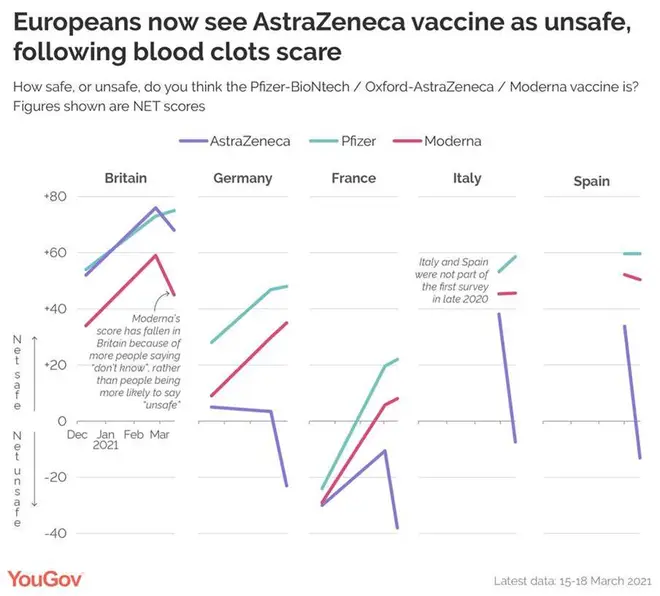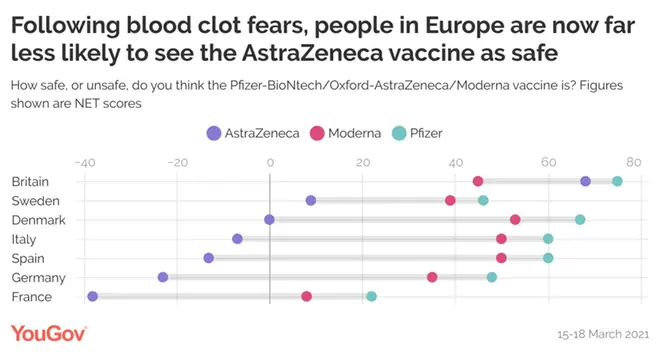
Matt Frei 10am - 12pm
22 March 2021, 00:01 | Updated: 22 March 2021, 16:49

European nations' stop-start approach to the Oxford-AstraZeneca vaccine has significantly damaged public perceptions of the vaccine's safety, according to a new YouGov survey carried out across Europe.
In Spain, Germany, France and Italy the jab is seen as more unsafe than safe, despite experts repeatedly confirming its safety.
Almost two in three people in France now believe the jab is unsafe, up 18 points since February, the poll suggests.
The sudden drop in perceived safety is likely to be due to the decision by 13 EU states to suspend the use of the vaccine earlier this month, amidst reports that it could increase the risk of blood clots.
Read more: Ursula von der Leyen threatens to block 19m AstraZeneca vaccine doses from leaving Europe
However, both the EU's own regulator - the European Medicines Agency - and the UK's Medicines and Healthcare products Regulatory Agency confirmed last week that the vaccine is safe and benefits "far outweigh the risks".
Dr Sabine Strauss, chair of the EMA vaccine safety committee, said they had found there is no higher overall risk of blood clots occurring after being vaccinated. In fact it likely reduces the likelihood.
Read more: 'No proven link between Oxford jab and blood clots' - UK regulator


In Italy and Spain, most people had previously felt that the AstraZeneca vaccine was safe, however since February this has fallen to around one in three - in both cases lower than the proportion who feel the vaccine is unsafe.
The figures will be of particular concern for European countries facing a third wave of infections. Over the weekend, France and Poland begun new partial lockdowns, while Germany is also expected to impose an "emergency break" amidst warnings of "exponential growth" in infections.
Read more: EU countries to resume use of Oxford jab after regulator says it's safe

Ex-French Health Secretary tells LBC the EU 'has to' take action
Only in Britain has the blood clot scare had little to no impact, with the vast majority still considering the vaccine safe, at 77 percent. This is down four points from February, but and still on a par with the 79 percent who see the Pfizer jab as safe.
This will be a relief to UK politicians and doctors, who have repeatedly emphasised that the vaccine is safe, with Boris Johnson even receiving the jab himself on Friday evening.
Read more: JCVI deputy chair calls for 'grown up' solution to EU vaccine crisis

Boris Johnson receives first dose of AstraZeneca vaccine
Following a rigorous scientific review of all the available data, the evidence does not suggest that blood clots in veins are caused by #COVID19 Vaccine AstraZeneca.
— MHRAgovuk (@MHRAgovuk) March 18, 2021
People should still go and get their vaccine when asked to do so.
Our new statement: https://t.co/h74nktC8if pic.twitter.com/CQ3dyAQ8ja
On Sunday, the deputy chair of the UK’s Joint Committee on Vaccination and Immunisation told LBC's Swabrick on Sunday he was “saddened” by how European leaders have run their vaccination program.
Professor Anthony Harden explained that the message from regulators “is that the vaccine is safe, there is no difference in blood clots between those that have been vaccinated and the general population”.
“It saddens me to see how the Europeans have run their vaccination program, because of course once you stop and start programs as they have done, and politicians make statements, then it loses public confidence and people don’t take up the vaccine," he added.
“We know that the one thing that is going to protect us and get us out of this pandemic is getting vaccinated.’’
Read more: Experts warn foreign summer breaks ‘unlikely’ amid concern over Europe's third Covid wave
Read more: UK marks third consecutive record day of Covid vaccinations

JCVI dep. chair demands 'grown up' solution to EU vaccine impasse
Commenting on the new research, Matt Smith, Lead Data Journalist at YouGov, said: “After concerns about its protection and potency were raised by leaders across Europe, the Oxford/AstraZeneca vaccine has undoubtedly suffered damage to its reputation for safety on the continent.
"Not only have we seen considerable rises in those who consider it unsafe in the last two weeks in Europe, the AstraZeneca vaccine continues to be seen as substantially less safe than its Pfizer and Moderna counterparts.
"With a third wave of infections potentially emerging now across the Channel, officials everywhere will be worried if ongoing rows about AstraZeneca’s vaccine ends up damaging the rollout.”